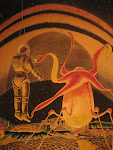
The exhibit on the top left is an outdated picture of one of my dynamic bookshelves (current state details triple stacking of new fiction acquisitions with SF titles moved to their own new wood tower*). On the right is the novel I finished last night.
*My partner and I are ambitiously attempting to create THE ULTIMATE COLLECTION OF SF MASTERWORKS! (by amateur bibliophiles with limited funds, that is ;-) I will post reviews of classic SF novels I have read in blogs to come, interspersed with a diverse range of other novels of merit and books I have enjoyed.
David Brin's Kiln People.
It's the first Brin novel I have been exposed to and my experience of it was initially ambivalent. The novel was well received, distinguished by earning 2nd place for 4 different 'Best SF/Fantasy of 2002' awards: the Hugo, the Locus, the John W. Cambell Award, and the Arthur C. Clarke Award - each time beaten to the prize by a different author.
Okay, so here's a brief and slightly dubious introduction to the key concept of Kiln People. Remember that movie that Egon (Harold Ramis) directed in 1996 starring the early 90's epitomy of hairy chested manliness (immortalised as Tim Burton's Batman), Michael Keaton and the hair of L'oreal, Andie MacDowell? In which Keaton made many annoying parody copies of aspects of himself to give himself more time to enjoy living? (Multiplicity). Except the copies soon diverged from the original coz of experience and there were unresolved envies and self conflict etc. Well, I have always liked the concept but I loathed that particular execution of it.
David Brin's Kiln People gets it correct. People imprint their knowledge, skills, memories, personality, thought patterns and nature into clay 24 hour-lived 'golems' (essentially disposable copies of themselves to varying standards of chosen fidelity and quality). The copies carry out their short-lived 'lives' and return to upload their memories to the original, thus creating continuity and resolving the Multiplicity problem. Alternatively, the original can choose not to upload the memory of the golem, for instance, if the task at hand was mundane routine. The future society is the paragon Big Brother State, highly influenced by the Megacorp that created kiln tech, United Kilns. The protaganist is a private detective called Albert Morris and the plot involves interwoven cases that he and his 'dittos' are investigating. So, essentially, it's a pretty classy whodunnit, as Morris investigates the 'moral degenerates' of organised crime and the death of an eminent scientist.
Now, without too many spoilers, these are some of the themes I really enjoyed.
The usefulness of multiple expendable 'lives'. I'd love to have a copy I could send to work in my stead. And another to do the housework. And to help me read the many books I wish to read. I would love the extension on my time. Which, conveniently, leads to the next theme: What would I do with all the free time? mmmm... Base human nature decrees that some of it will be spent on the morally dubious. There's no risk involved anymore. The jaded desensitised world Brin creates is an interesting one and a pretty good speculation, given the current preoccupation with the sex and violence industry.
Some reviewers have felt that there was a great chasm between parts of the novel, from the SF whodunnit to a heavier metaphysical/ quantum physical leap towards the conclusion. But I kinda saw it coming. He's not ponderous about it, but he alludes to bigger ideas throughout Kiln People. I will admit that the style felt a bit discordant, and went from very readable to lets-read-that-again-slowly-with-my brain-turned-on-to-comprehehend-philosophy/SF quantum physics-mode. Yet, the departure from excellent readability was brief and satisfying. Brin credits the reader with (some) higher intelligence. It's quite flattering. And the (hopefully) ironic and artful use of deux ex machina (else I would be rather more critical) was enjoyable.
One thing he does do with distinction (although I was resistant at first) is create a lexicon to describe his concepts with humour and erudition. Kiln People was an entertaining read, with enough substance to warrant the nominations it received.
My partner has read other novels by Brin, and lauded some of his earlier work. I have every intention to get my greedy little paws on them, and add him to the (expectedly long) list of authors with the *trixi stamp of approval ;-)

No comments:
Post a Comment